After extensive consultations with local community groups and climate action partners, such as the Ministry of Environment and Natural Resources, Government of Ekiti State; Triple G Eco-Revival Solutions; the Ekiti State Field Office of the National Environmental Standards and Regulations Enforcement Agency, an environmental agency of the Federal Government of Nigeria; The Green Institute; and the ABUAD Green Club amongst others, ABUAD has released its Climate Change Action Plan. The Plan is a framework document that elaborates guidelines in our efforts to transition to renewable and low-carbon energy sources and to deepen & strengthening the already achieved net-zero carbon emissions in 2024. The Plan defines the objectives and activities of the University as well as the axiological basis for achieving these targets. In a similar vein, like 2023, In 2024, the University Climate Change Action Plan was reviewed with the Ministry of Environment and Natural Resources, Government of Ekiti State; Triple G Eco-Revival Solutions; the Ekiti State Field Office of the National Environmental Standards and Regulations Enforcement Agency, an environmental agency of the Federal Government of Nigeria; The Green Institute, Hydrogen Research Institute, and the ABUAD Green Club amongst others. This review of the University Climate Change Action Plan was consummated with a symposium to mark World Environment Day 2024 tagged “Land Restoration, Desertification, and Drought Resilience (Our Land. Our Future)”
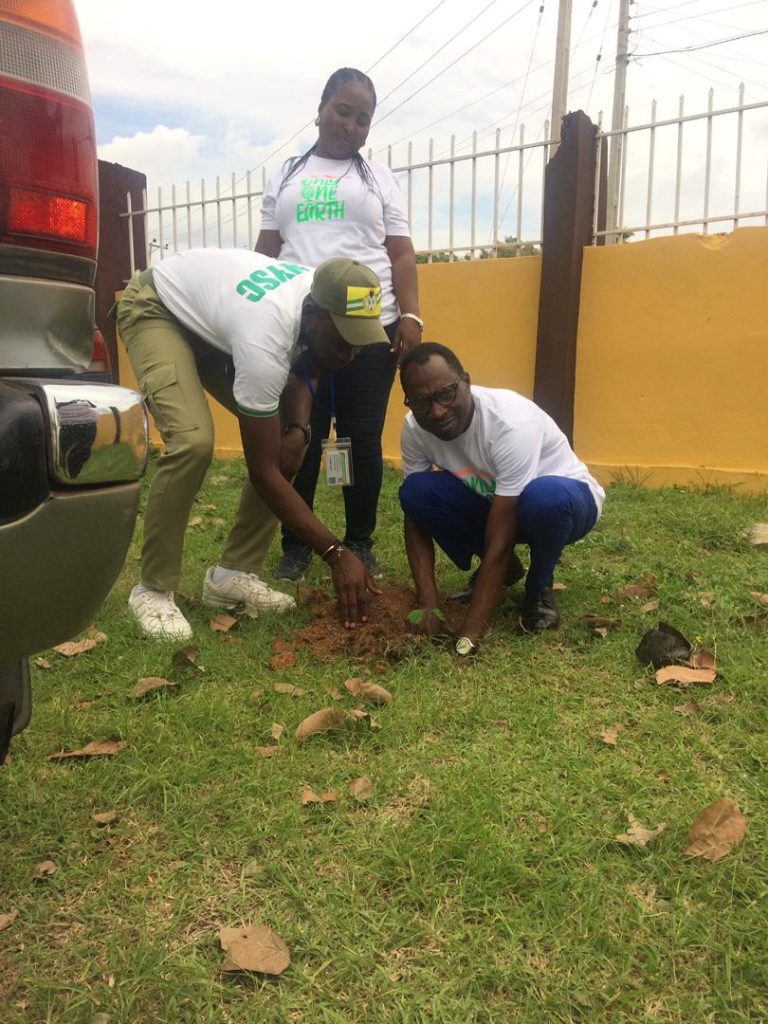

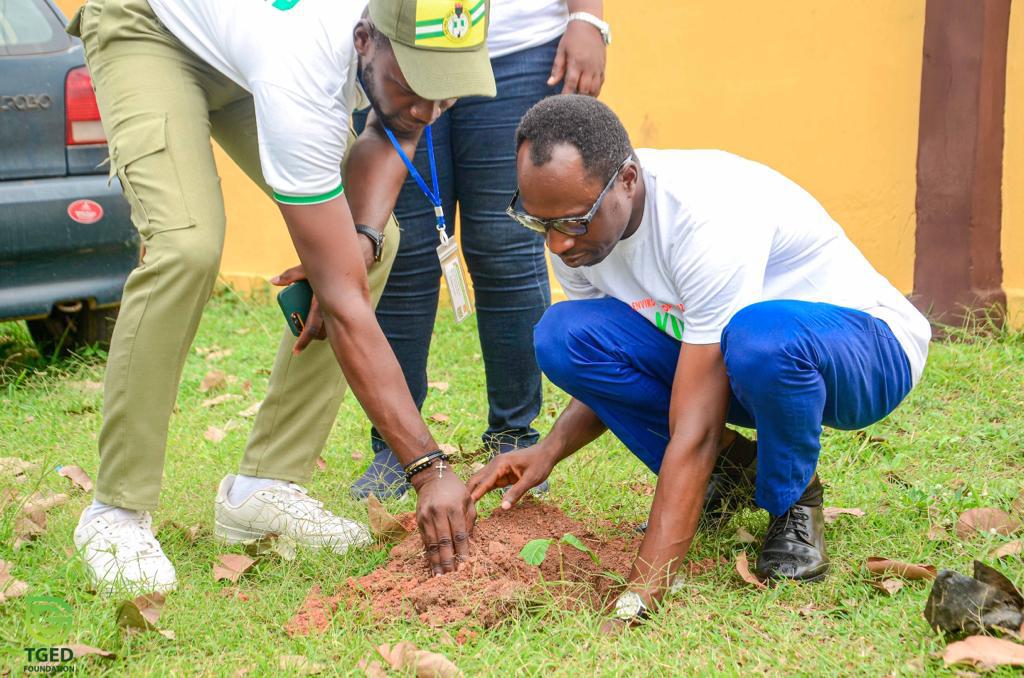
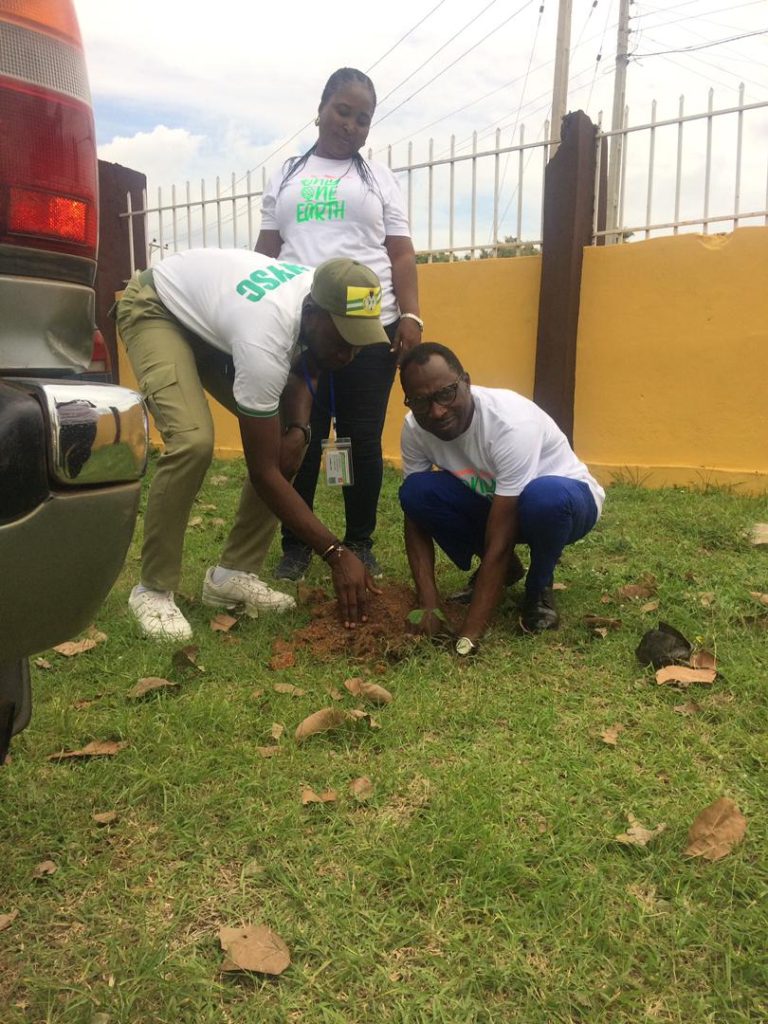
The 2024 reviewed ABUAD Climate Change Action Plan contains an elaborate framework of targets, indicators, and targets for cooperative planning for climate change disasters in partnership with key disaster response agencies and ministries of the Government of Nigeria and Ekiti State. The 2024 reviewed plan builds on existing partnerships with the Ekiti State Field Office of the National Environmental Standards and Regulations Enforcement Agency, an environmental agency of the Federal Government of Nigeria; the Ekiti State Emergency Management Agency (SEMA); Ministry of Environment and Natural Resources, Government of Ekiti State; and the Office of the Senior Special Assistant to the President on Sustainable Development Goals (OSSAP-SDGs) amongst others.

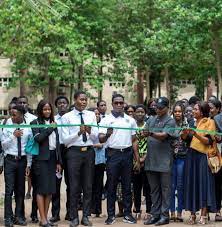



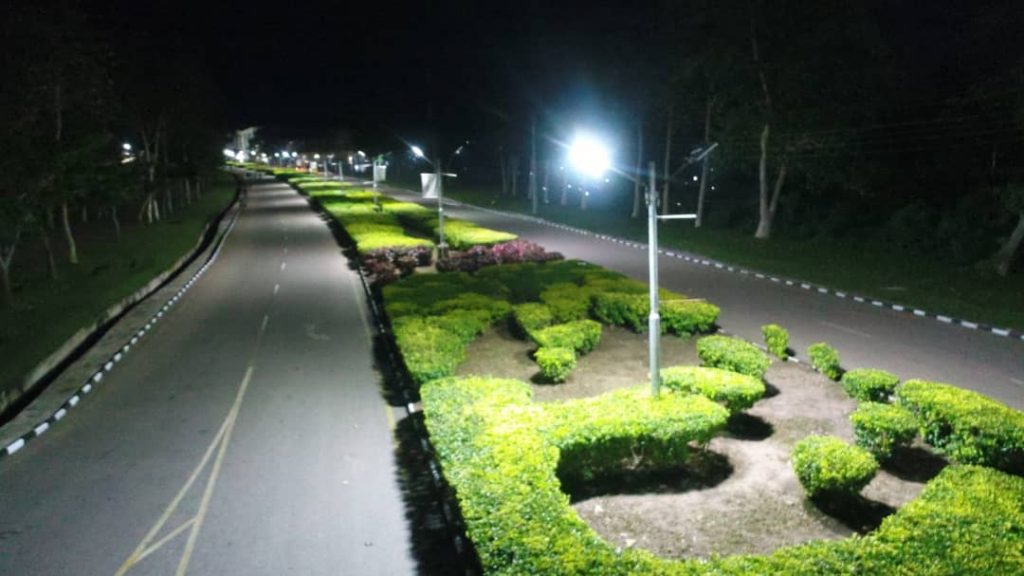
In the 2024 ABUAD Climate Change Action Plan review, we harnessed invaluable insights from a diverse group of stakeholders, illustrating our commitment to collective action. We have created a comprehensive dialogue around climate change by engaging with 75 community leaders—a remarkable 200% increase from 2023—along with members of the ABUAD Board of Trustees, Governing Council, and Alumni Body. An impressive turnout of 150 Student Representative Council members, a staggering 300% growth from last year, along with the ABUAD Governing Council, management staff, and 155 faculty members, reflecting a 210% increase, further strengthened our initiative. Additionally, contributions from 65 administrative staff, seven non-government organizations (a 35% rise), 12 community-based organizations (up 40%), and 82 National Youth Service Corps members—a 350% increase—demonstrate unparalleled interest and investment in our climate goals.
This extensive feedback underscores our shared vision to assess and elevate the effectiveness of our climate action plan. We aim to create a robust, dynamic framework that serves as a living document detailing essential indicators, metrics, and targets. By doing so, we will seamlessly integrate campus climate resilience into the overall ABUAD climate strategy—ensuring we make impactful strides toward a sustainable future.
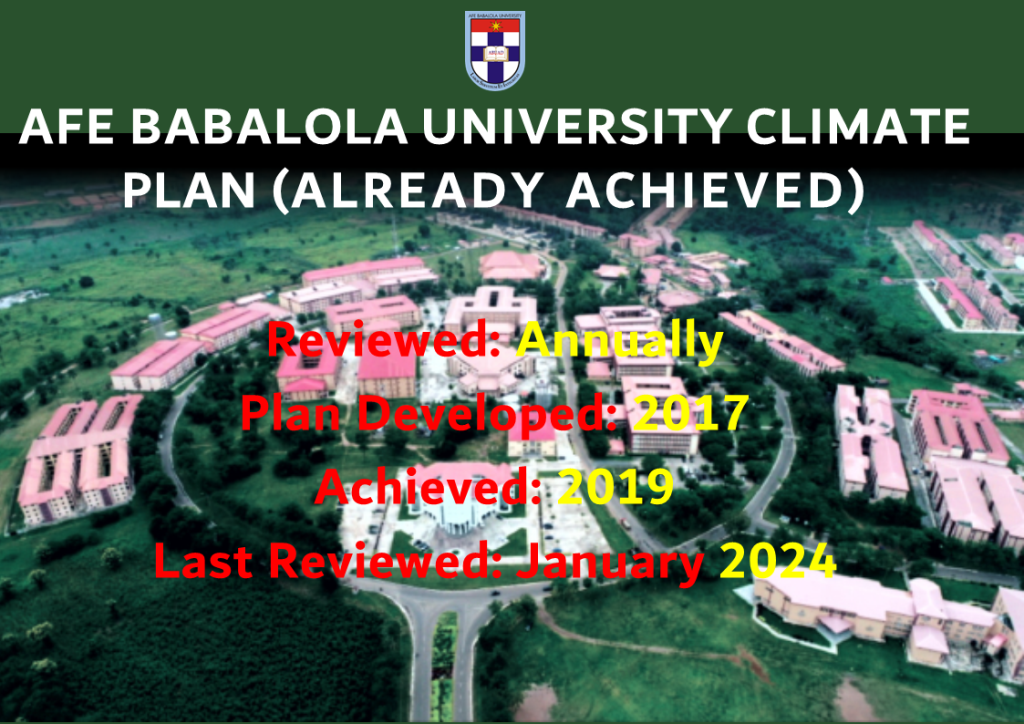
Click here to read 2024 Reviewed ABUAD Climate Change Already Achieved Plan
ABUAD-Climate-Change-Plan-Already-Achieved-Reviewed-2024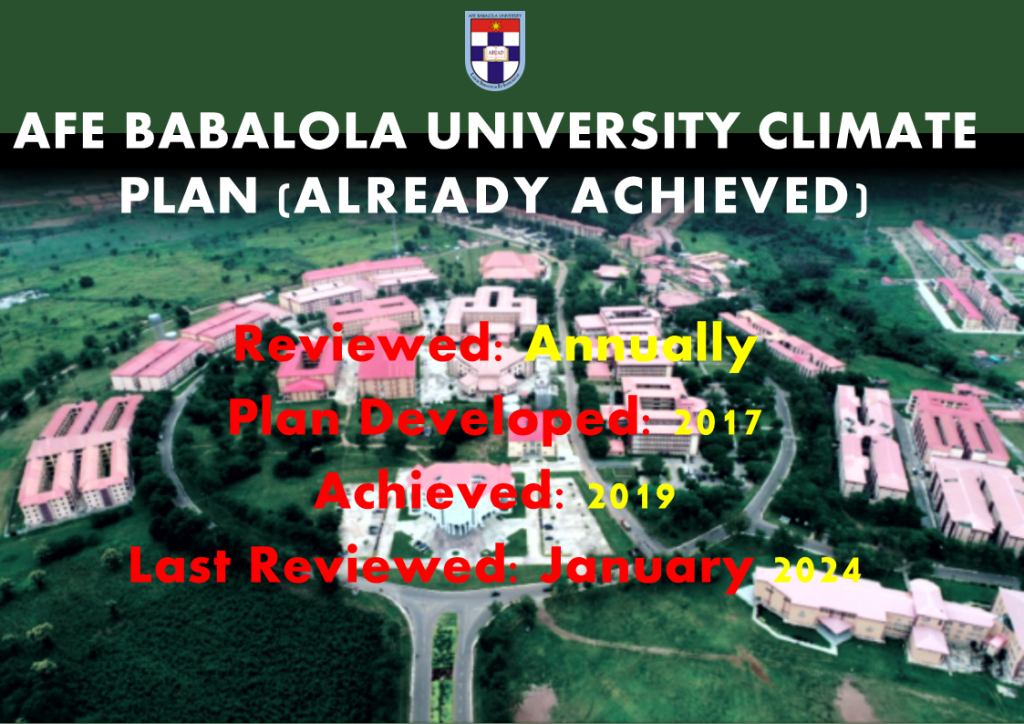

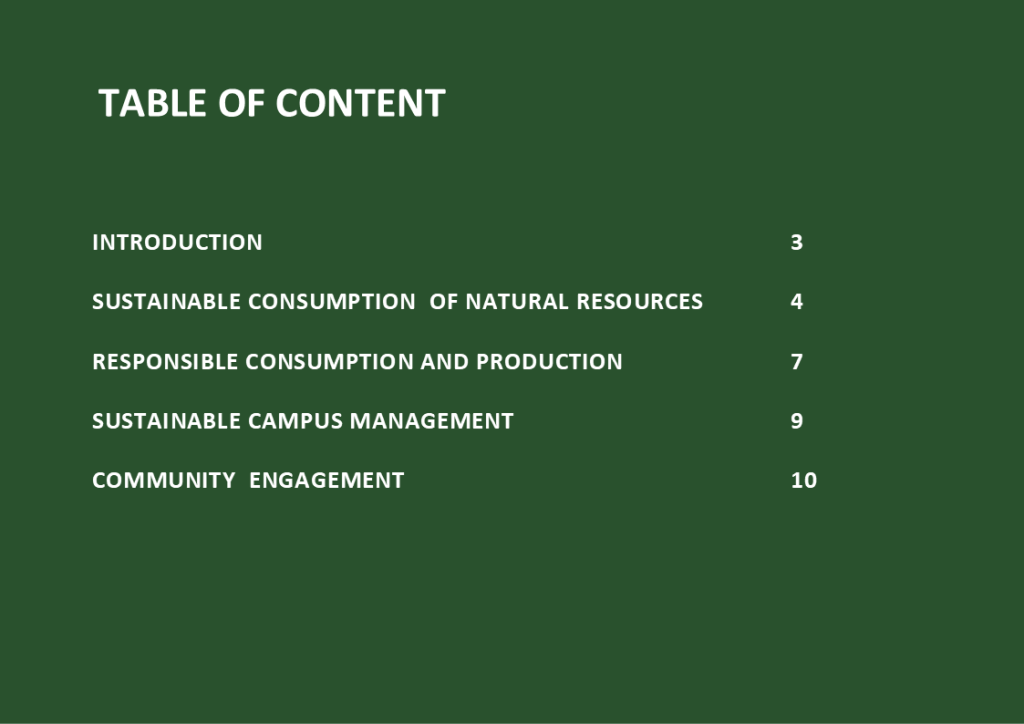
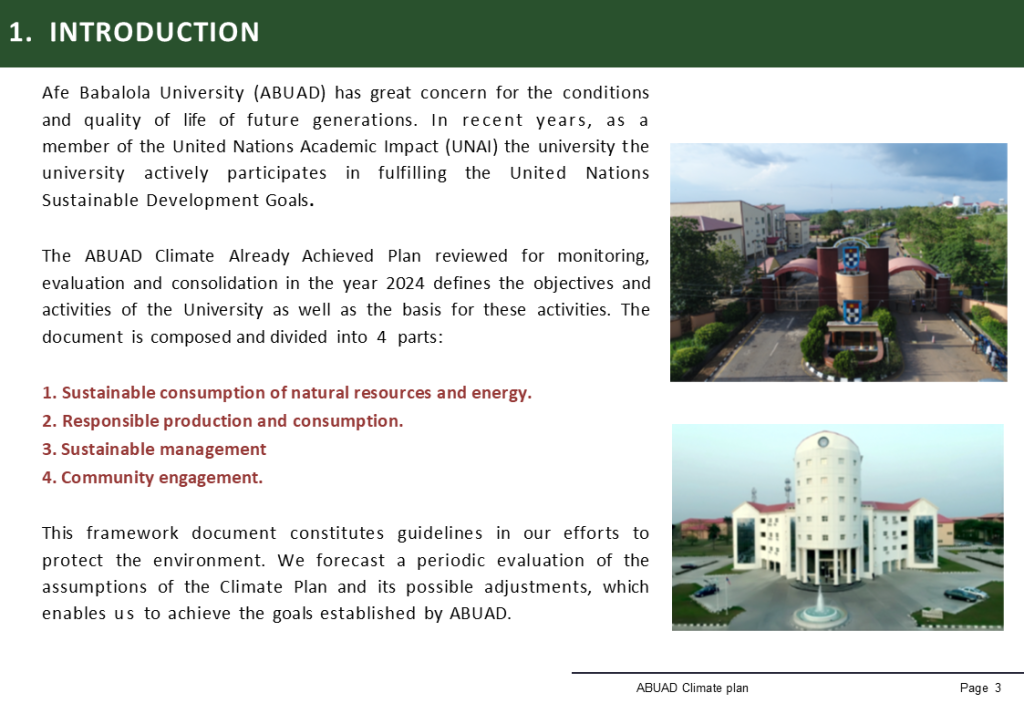
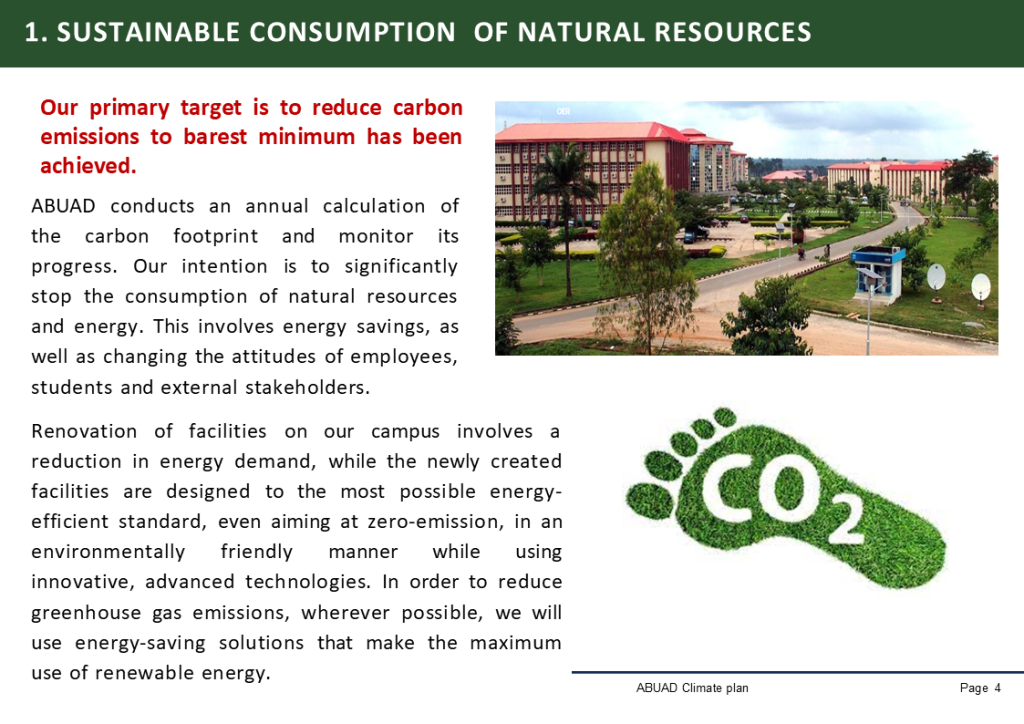
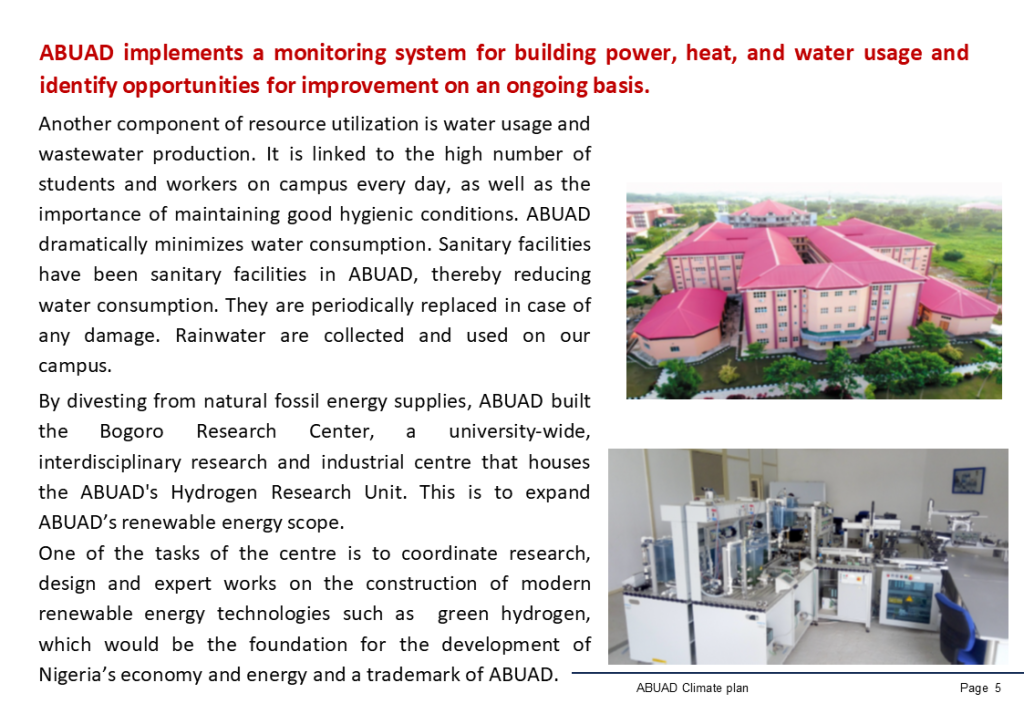
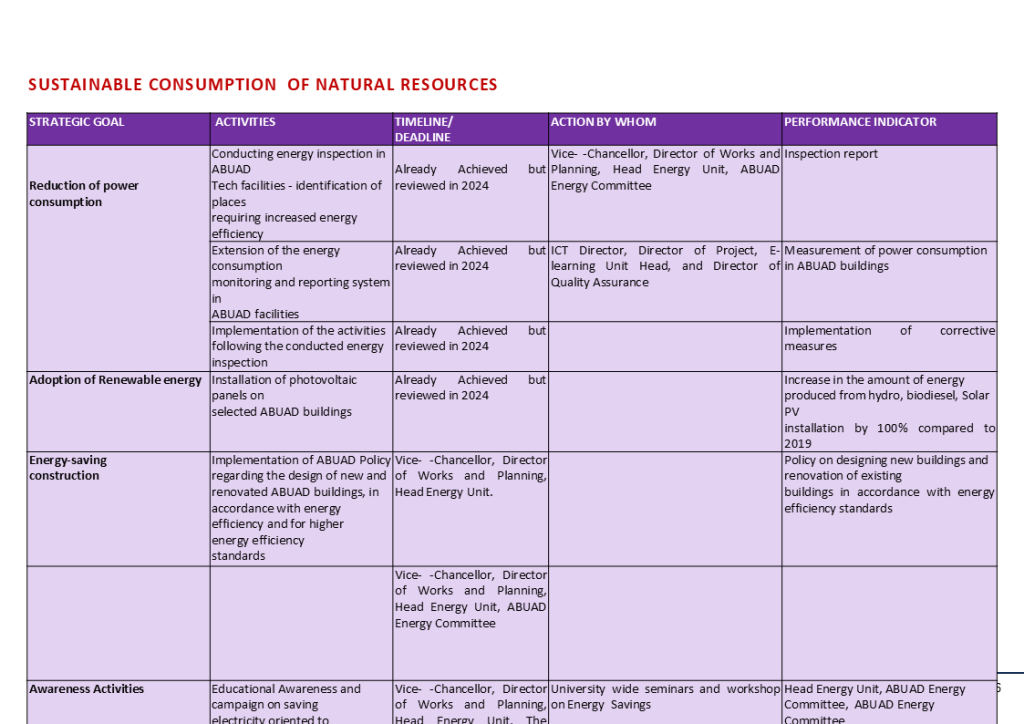
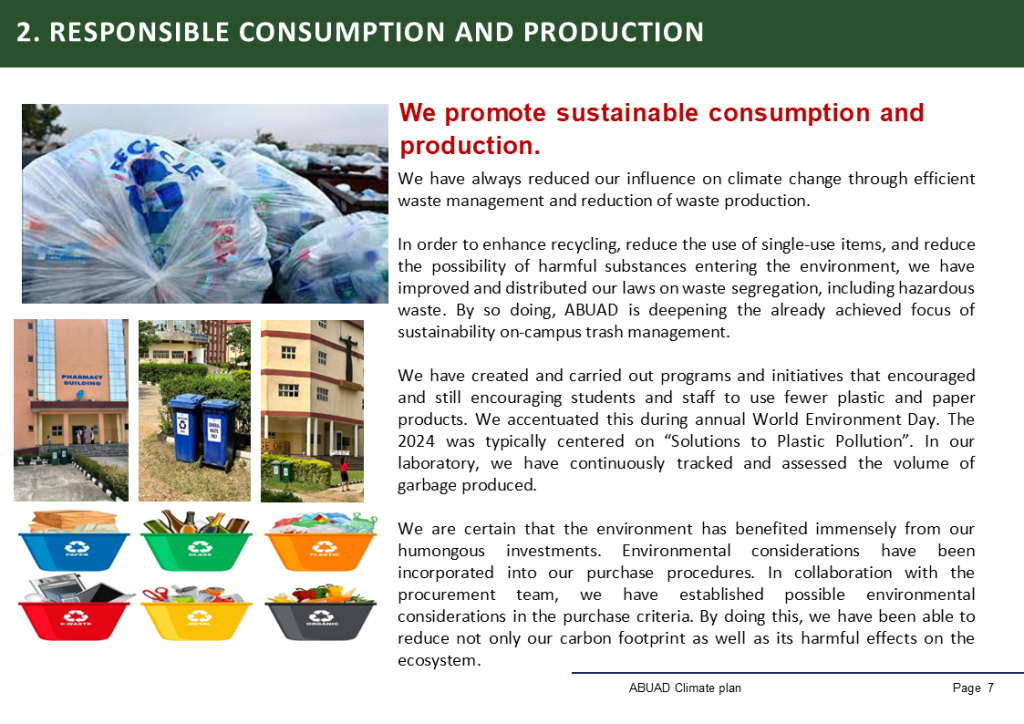
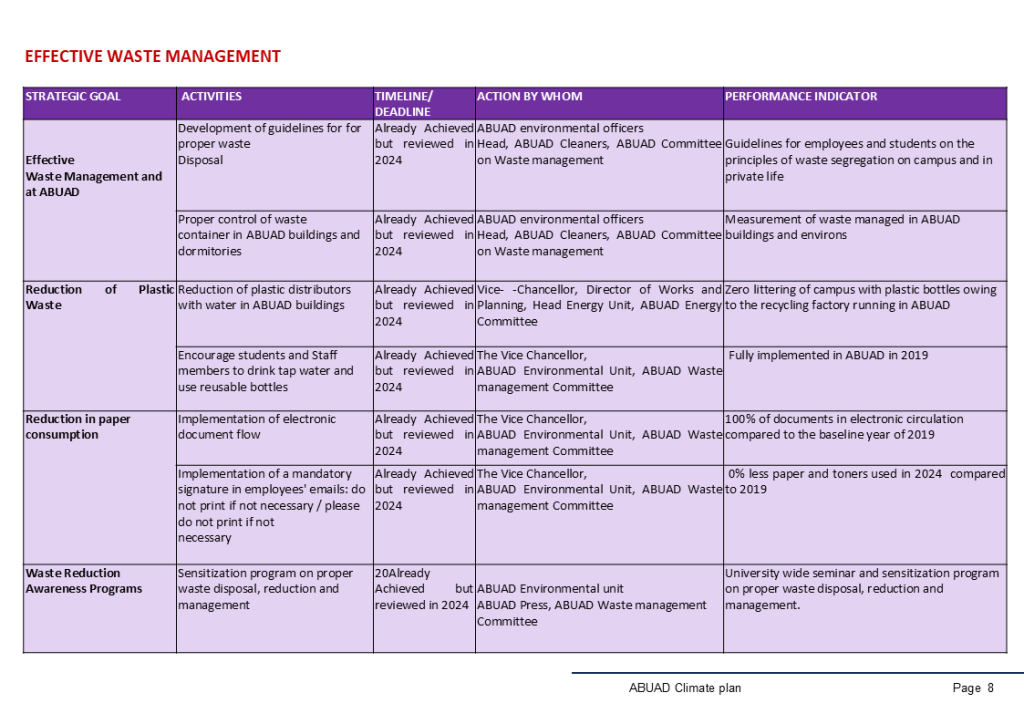
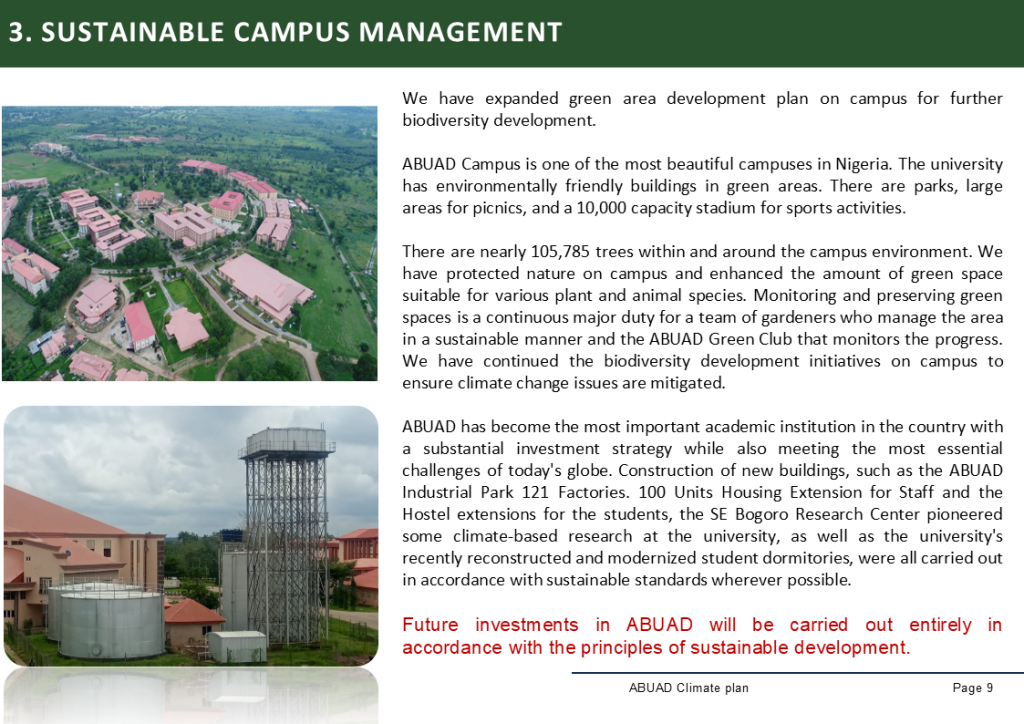
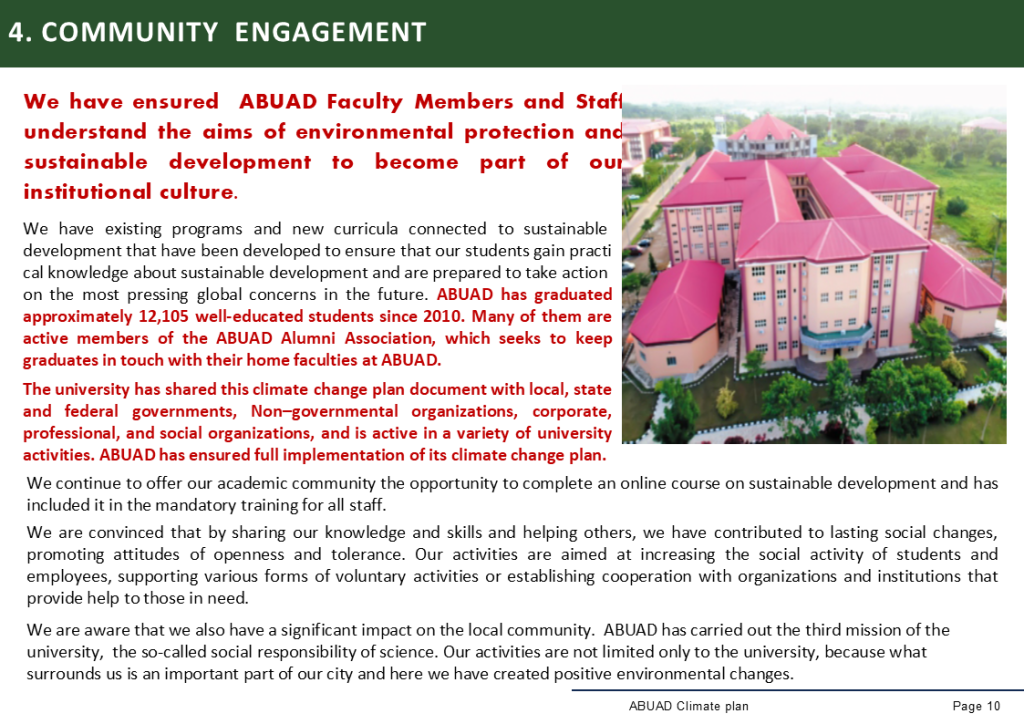

ABUAD Makes Green History, Reviewed its Carbon Neutrality Policy and Plan for better Efficiency and Effectiveness
As part of its commitment to deepen the already achieved carbon-neutral university campus, In 2024, ABUAD reviewed its Energy and Utilities Sustainability Master Plan, which serves as a roadmap for achieving long-term goals and strategies aligned with the university’s mission and vision to enhance energy efficiency and conservation practices across all facilities, buildings, and campuses.
The reviewed 2024 ABUAD Energy and Utilities Sustainability Master Plan represents a significant commitment to climate action and carbon neutrality by any university in Nigeria. It sets the ambitious goal of shifting 100% of electricity consumption on the ABUAD campus to renewable energy sources. Furthermore, it includes a firm commitment to continually monitor the already reduced greenhouse gas (GHG) emissions at ABUAD, which is already 100% , with the aim of continually benchmarking the carbon-neutral campus. The plan reiterates the necessity for the ABUAD Directorate of Works and Services to continue providing “world-class” energy services to support the university’s status as a leading and rapidly growing institution in Nigeria.
During a review meeting held at the Office of Sustainable Development Goals (SDGs) of ABUAD in the White Rock, the Chairman of the University Sustainability Committee and Deputy Vice Chancellor (Academic Research, Innovation, and International Partnerships), Professor Damilola Olawuyi, SAN, emphasized, “This innovative reviewed plan establishes a framework for acceptable protocols, practices, and operational standards that align with the university’s strategic direction, prioritizing academic excellence, creating a positive community impact, and fostering innovation for effective social transformation.” The reviewed plan outlines strategic programs, activities, and partnerships to guide sustainability planning, budgeting, operations, and all facets of the university.
Professor Olawuyi expressed gratitude to all ABUAD partners, including NGOs, Community-Based Organizations (CBOs), government institutions, and faculty members for their contributions in shaping the development and review of this plan, and he looks forward to more collaborative implementation efforts.
He also paid tribute to the Chancellor and Founder of the University, Aare Afe Babalola, SAN, OFR, for his inspirational and transformational leadership and commitment to sustainability and climate action, which were crucial for the review of the framework plan. Additionally, he commended the Vice Chancellor of ABUAD, Professor Smaranda Olarinde, FCArb, FCAI, for her trust in the work of the Sustainability Office and Committee, which has led to both the crystallization and the ongoing review of the climate action plan.
ABUAD/OGEES Assistance on Energy
In 2024, ABUAD continues to provide financial assistance and training on energy citizenship and low-carbon technology development to local start-ups through the OGEES Institute.
The Institute aims to continuously promote entrepreneurial culture, capacity building, training, and empowerment within and outside ABUAD. Through research, training, community engagement, and societally relevant publications, the Institute serves as a hub facilitating collaboration between high-level, internationally recognized researchers and teaching staff of the University and other institutions within and outside the country.
In 2024, the Institute organizes another round of free training courses on energy citizenship. The participants are trained in the establishment of environmentally sustainable ventures. At the end of the training, each successful candidate got start-up seedlings and N250,000 cash. Over 250 participants benefited from the start-up seedlings and N250,000 cash in the 2024 edition totaling N62,500,000.00 cash investment to the participants in 2024, an increase of 278% over the 2023 edition

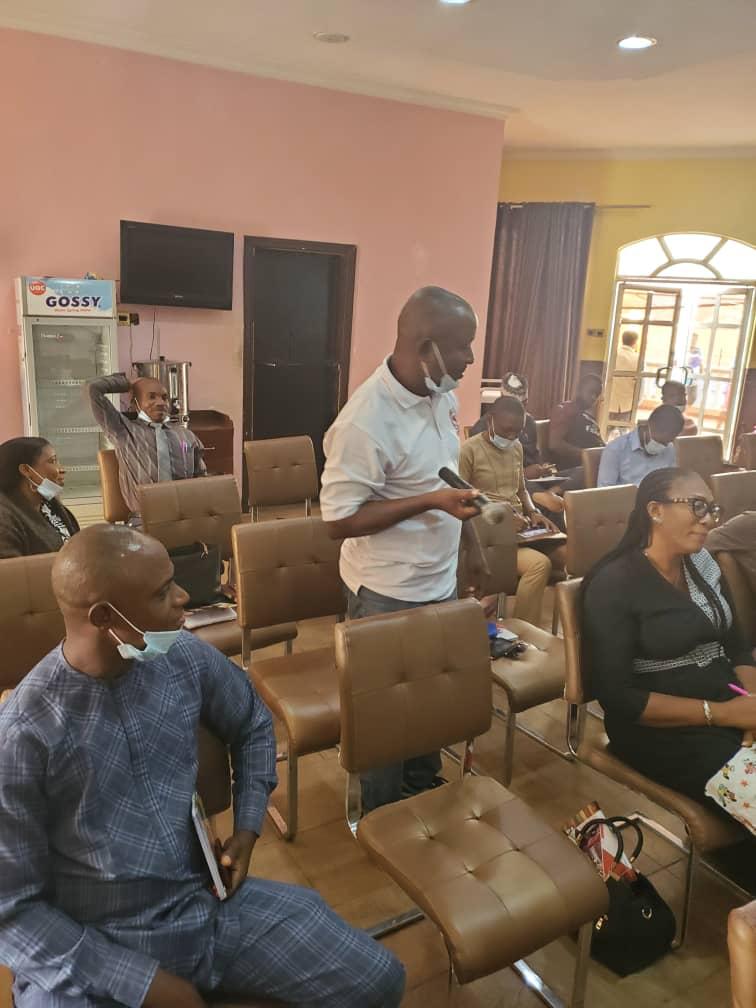
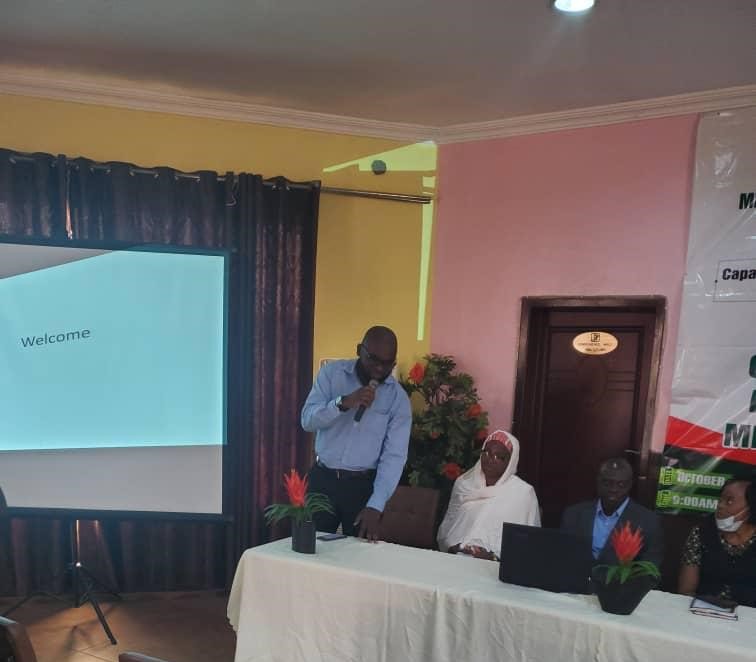

The significance of carbon reduction and emission control cannot be overstated when it comes to the overall health and well-being of Afe Babalola University. In 2024, this importance is underscored by the presence of the university’s 400-bed, state-of-the-art hospital, featuring ten modular theaters and a comprehensive multisystem approach to healthcare. Recognized as one of the premier healthcare institutions in Africa, the hospital is dedicated to providing top-notch medical care to its patients. Consequently, it is vital to address and minimize the levels of air pollutants in the surrounding environment. By doing so, we can alleviate the strain on healthcare facilities and ensure they can continue to function effectively as essential life-saving centers for the community.

The recycling plant located within the University Industrial Park has officially commenced its operations, marking a significant step towards sustainability. It is widely recognized that carbon emissions have a detrimental impact on quality of life, contributing to a range of chronic health issues and even leading to premature death over time. In response to this pressing concern, the University has implemented a comprehensive system designed to mitigate carbon emissions through various effective measures.
One of the key initiatives is the extensive tree planting program. Often affectionately referred to as ‘WOODLAND’, the university has dedicated itself to a continuous process of afforestation. In 2024, the ABUAD Clean and Tree Club achieved remarkable results by planting additional 425 trees across the campus, reflecting an impressive increase of 53.4% compared to the previous year. This notable surge in tree planting not only enhances the beauty of the university grounds but, more significantly, plays a vital role in absorbing and storing carbon dioxide. The presence of these trees throughout the campus contributes significantly to reducing carbon emissions and lessening harmful environmental impacts.
The ABUAD Clean and Green Club, an inclusive organization committed to fostering environmental awareness and actions, has been instrumental in this endeavor. Their dedicated efforts aim to establish a sustainable and thriving campus environment, demonstrating a strong commitment to increasing tree planting initiatives in 2024 and beyond.




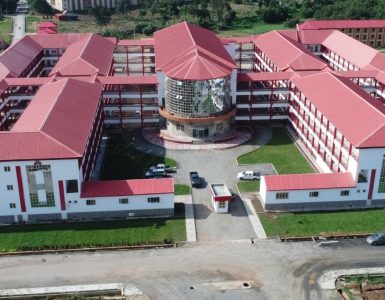












Add comment